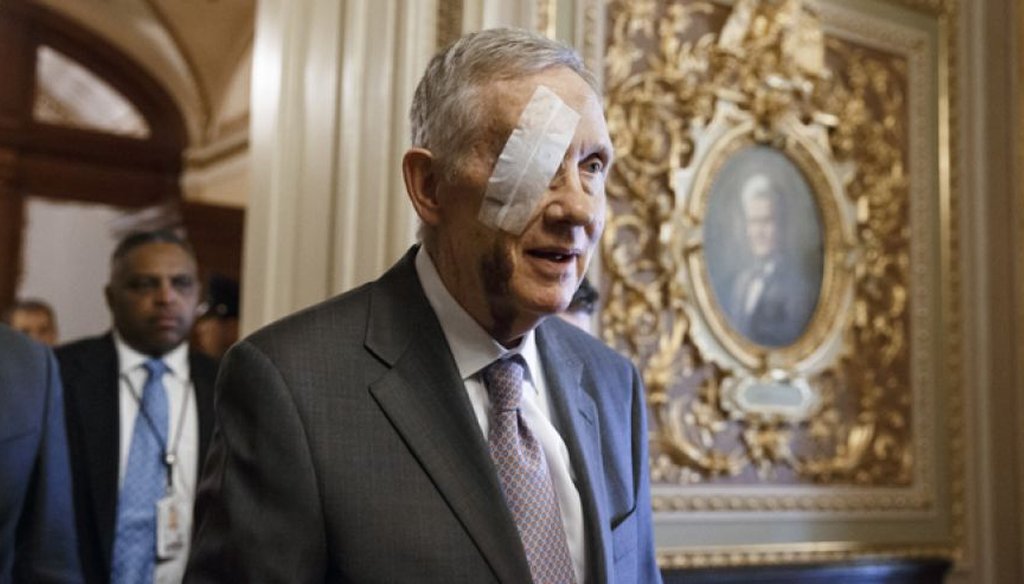Stand up for the facts!
Our only agenda is to publish the truth so you can be an informed participant in democracy.
We need your help.
I would like to contribute

A Nevada man decides to test how far a blogger will go to publish an uncorroborated story about Senate Minority leader Harry Reid's January eye injury. AP photo.
A month ago, before reporters from Las Vegas to Washington knew him by his real name, Larry Pfeifer told a lie.
He doesn’t dispute it. He promotes it. The 50-year-old Henderson, Nev., man, says he crafted a rudimentary hoax about injuries sustained by Senate Democratic leader Harry Reid to show how easily partisan media could jump for a juicy story.
And jump they did.
"I had a mission," Pfeifer said. "I am sick of reading bull- - - -. I am sick of lies. I am sick of people’s lives being destroyed."
But is lying the best way to stop lying?
Pfeifer shared his story with PunditFact, the fact-checking website of the Tampa Bay Times that focuses on members of the news media.
It all started, Pfeifer said, with his general disappointment in the media lately, like Rolling Stone’s botched story of a campus rape at the University of Virginia. So when a conservative blogger published a wild story linking a Mafia beat-down to an eye injury that Reid said happened during a workout, Pfeifer says he intended to call the writer up and chew him out.
But instead of arguing with Power Line’s John Hinderaker, Pfeifer told him he knew what really happened to Reid’s right eye.
The real story, he told Hinderaker using the pseudonym Easton Elliott, involved a drunken punch from Reid’s brother, Larry.
It went like this: Larry showed up drunk and agitated at an Alcoholics Anonymous meeting in Henderson on New Year’s Eve. Larry had blood on his midsection, a swollen left fist, and was talking about how he blacked out, woke up and was on the ground fighting with a family member. He worried about the Secret Service coming after him.
The AA members didn’t know it was Harry Reid’s brother, Pfeifer told Hinderaker, until they saw a news report weeks later about Larry Reid being arrested on charges of drunken driving. The picture in the paper matched up with the guy at the meeting.
Pfeifer says now he wanted to see if Hinderaker would really run with his story or if Hinderaker would seek more witnesses, demand more facts or catch the red flags he planted (intoxicated people are not allowed to sit through AA meetings).
Hinderaker did seek more details, but he also ended up publishing the story as is.
The story quickly spread over the Internet and made it to Rush Limbaugh’s talk-radio show April 15. Limbaugh detailed how had he talked over the scoop with "Easton Elliott" and Hinderaker a couple weeks before.
"I did raise the specter that it did appear to me that Dingy Harry got beat up," Limbaugh said before launching into the story. "I don’t know by who, although I might now. Bottom line is, I might now know who did it. And I wasn’t even gonna bring this up."
The real truth came about 10 days later, when Pfeifer (pictured below) told the Las Vegas Sun he was Easton and the story was fake.
• • •
Pfeifer’s experiment (or attention-seeking) illustrates a hole in modern-day media.
In the rush to deliver a scoop, media often will publish first and worry about facts second.
That’s how prank callers get on CNN pretending to be a police spokesman discussing damage from an earthquake. Or how a St. Petersburg blogger wrongly pronounced U.S. Rep. C.W. Bill Young dead in 2013. Or how media incorrectly reported that arrests had been made in the Boston Marathon bombings before the real suspects were caught.
"People are so used to these stories, and there are no consequences," Pfeifer said. "I think people have given up."
Still, Pfeifer’s decision to aggressively promote a fake story is almost impossible to justify as a greater good, said Kelly McBride, a media ethicist at the Poynter Institute, a school for journalists that also owns the Tampa Bay Times. Hinderaker accused Pfeifer of playing a game.
Robert Drechsel, professor and director of the Center for Journalism Ethics at the University of Wisconsin, largely agreed.
"I’m not sure he really had much of a point to prove," Drechsel said. "He was risking doing some serious damage here to absolutely innocent individuals, and for what? I don’t think he proved anything that should come as a great shock to anybody."
Even so, journalists have an obligation to verify their sources.
"The greater transgression in the realm of the world of ethics comes when the journalists don’t do their due diligence," McBride said.
One thing that irked Pfeifer was how both Hinderaker and Limbaugh presented his story: Both men prefaced their scoop with a caveat they couldn’t corroborate it.
Hinderaker, while guest-hosting Laura Ingraham’s conservative talk-radio show, said, "Is Easton Elliott telling the truth? I have no absolutely no idea."
On his own show, Limbaugh said, "Hinderaker can’t vouch for it; neither can I."
The qualifiers may make Limbaugh and Hinderaker feel better, but the language is useless, Drechsel said.
"How can any reader possibly have enough information to judge the validity of it?" Drechsel said. "You can’t help but think the motivation is they really do want that message to get out."
• • •
Pfeifer says he is apolitical and has never voted in his life, largely as a result of being a convicted felon. He’s a former nightclub consultant who now says he spends part of his time as a "motivational life coach."
He says one bit of criticism is valid: that his actions may have caused harm to Harry or Larry Reid, who really was arrested in February on charges that included driving under the influence and battery on a Nevada Highway Patrol trooper.
Pfeifer says he wouldn’t want to hurt someone who may need help, and he tried to speak to Reid through an assistant in Washington. He stands by what he did.
"The whole point is it’s not about him getting beat up," he said of Harry Reid. "This is about irresponsible journalism."
Harry Reid apparently agrees.
"I don’t see why he should apologize. I’m glad at what he did," Reid told the Las Vegas Review-Journal. "It shows how foolish journalism is as we know it. It’s evaporating, and that’s too bad."
Our Sources
Interview with Larry Pfeifer, [email protected], April 28, 2015
Interview with Kelly McBride, Poynter Institute media ethicist, April 29, 2015
Interview with Robert Drechsel, University of Wisconsin journalism ethics professor, April 29, 2015








































